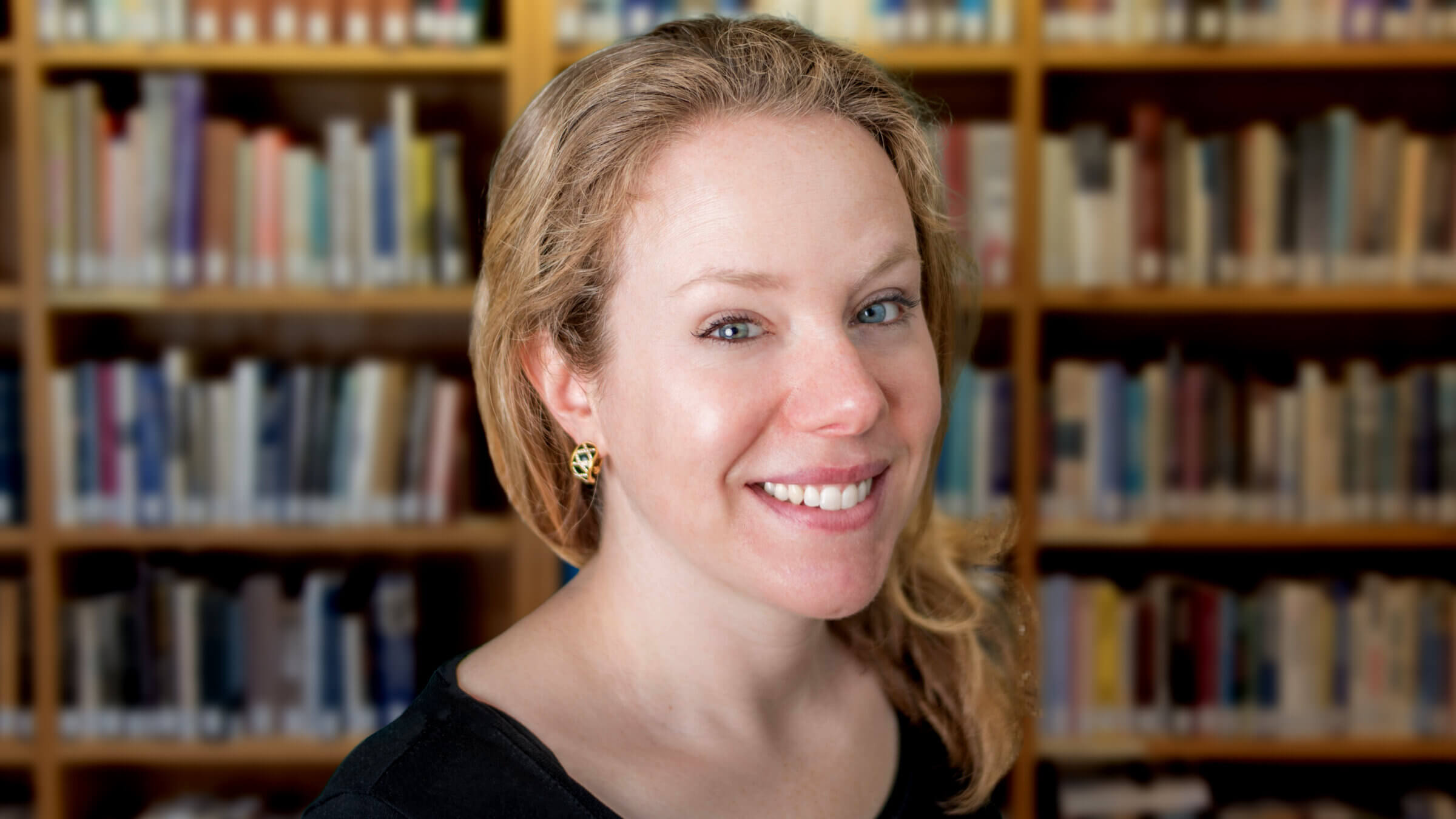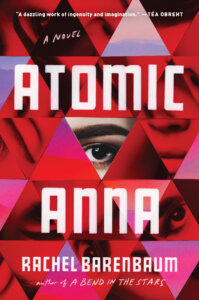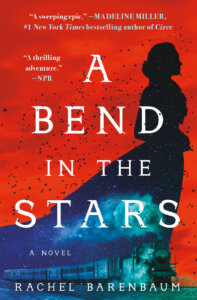If you could save your family or the rest of the world, which would you choose?
Rachel Barenbaum’s novels grapple with tough questions that have vexed Jewish thinkers for ages

Rachel Barenbaum is the author of ‘Atomic Anna’ and ‘A Bend in the Stars.’ Photo by Albert Paniagua
“I write about strong women, and women breaking barriers — strong Jewish women who are fighting for new positions in the world, who are fighting to change the world,” Rachel Barenbaum told me. Barenbaum is the author of the novels “A Bend in the Stars” and the recently published “Atomic Anna,” “I love talking about that, and I love that to be front and center,” she said.
“A Bend in the Stars,” published in 2019, is set in 1914, in pre-World War I Russia — a world of violent antisemitism — and concerns a Jewish sister and brother. She’s a surgeon and he’s a scientist racing to try to be the first to prove Einstein’s Theory of Relativity.
In “Atomic Anna,” Barenbaum imagines the chief engineer at Chernobyl in 1986 in the Soviet Union to be a Jewish woman, Anna Berkova, and that the explosion at the nuclear facility allows Berkova to travel in time, which will allow her to help prevent the disaster. The plot also involves Anna’s child, Molly, whom she had given up decades earlier to a Soviet Jewish couple that emigrated to Philadelphia, and Anna’s granddaughter, Raisa.
Critics have called “Atomic Anna” “an incredible achievement,” “masterfully plotted,” “lyrical and unflinching” and “propulsive and intimate.”
In “A Bend in the Stars,” each section is named for a month of the Jewish calendar. The first words of “Atomic Anna” are “Pirkei Avot” — “Chapters of the Fathers,” a renowned ancient book of Jewish ethical teachings. And quotes from it begin each section.
“I go to synagogue most Shabbats,” Barenbaum told me. “We have Shabbat dinner. I grew up in Philadelphia, at Germantown Jewish Center. It’s a very big synagogue. It’s Conservative in the main sanctuary but there are all different minyanim throughout the building — upstairs, downstairs, all around. So I grew up with Reconstructionist, Reform, Modern Orthodox, Conservative, all under one roof. The Jewish roots were deep, and the questions — the ethical and moral questions coming from Judaism were very deep and something discussed all the time. ‘We’re all Jews under this roof. What does that mean?’”
“I read ‘Pirkei Avot’ for the first time in full in Israel when I was a Shalem Center fellow in Jerusalem, in 1998-99,” she said. “I thought I was going to be a philosopher. I was reading these questions, and I’ve been fascinated with the book ever since.”
“‘Pirkei Avot’ brings up morality in these big juicy questions that I love to address in my ‘Atomic Anna’ characters,” she said. “They’re three generations of women who are fighting to build a time machine. It’s about saving their family, stopping Chernobyl. And the bigger question that they face right from the beginning for is, for Anna, ‘Should I save my child and my family or should I go back and stop Chernobyl and save thousands and thousands of people?’”

This is a question similar ones that Jews have faced many times in history, Barenbaum said: “Should we save the children or should we save the elderly? Who should we save? Why?”
“You might be able to sit in this room and say you think you know the answer, and maybe I can say what’s right or what I think is right. But when you are in that moment — when I start the book and Anna is on Mount Aragats [in Armenia] and is holding her dying child, and that question,” the family or Chernobyl, “comes up, how do you choose? How can you choose in the moment? And that is what ‘Pirkei Avot’ addresses. There are no answers; ‘Pirkei Avot’ is all about questions. That is why it’s in my book. To keep us talking about it So when the moment comes we are ready to talk about it.”
Both of Barenbaum’s novels demonstrate her strong interest in Russia and its history.
“My family on one side came over from Russia,” she said. “My grandmother died when I was very young but her two sisters came to our house very often on Friday nights. They would always call me over. I was the oldest. I loved them very much but they smelled like herring and Manischewitz and it was scary. And they would say to me, ‘Do you know where the passports are?’ And ‘Do you know where the emergency money is?’ Because that was my job. I grew up with that. They spoke to each other in Yiddish but I was only allowed to speak English with them. I wanted to know, I would say ‘Why did they leave?’ We had all these photographs all over the house of these old relatives and I would ask, ‘Who are they?’ and ‘Why did they leave?’ and ‘Where are they now?’ and I never really got answers. So of course that’s all I ever wanted to know about. They would say, ‘You never go to the Soviet Union, we’re never going back there.’ So I’ve spent my life wondering about that time, wondering about Russia. That’s where my books start — because of that fascination.”
The concern about passports and emergency money came, of course, from the uncertainty of life in Russia and the Soviet Union — the antisemitism, the violence, the pogroms, the knowledge that the Cossacks might be coming, the knowledge that it could happen any time.
“Even in America,” she said.
One theme of her books is that even small decisions can greatly affect the future.
“In ‘Atomic Anna’ I spend time defining the rules of time travel,” she said. “I go by the rules of two. You can travel someplace for only two hours. You can travel back there only two times. The characters talk often about it’s not a lot of time. But it is a lot of time. Because you can change little pieces, and the little pieces add up to big things. I believe that in everything, you can make one small change, make one little decision, and it snowballs into something that is much larger. That’s something that happens with my characters. You see that with Anna and Molly and Raisa throughout the book. And also in real life too.”
In “Atomic Anna,” comic books play a major role. Molly is a comic-book artist, and Atomic Anna is a comic-book character. I asked her why comic books play such an important role in her novel.
“In the 1970s, when Molly comes into comic books, we are in the middle of the second wave of feminism, as it’s called — Gloria Steinem, Bella Abzug, Shirley Chisholm,” Barenbaum said. “This is the moment, and I love that moment, we were fighting for universal child care, women’s rights — everything that now may be torn down if Roe v. Wade goes down. But that was the fight, and I love that energy, and Molly gets swept up in it because in the comic-book world with people like Trina Robbins [a cartoonist in the underground comic movement] we have women who are depicting in comics their struggle and the changes they want. This a major moment. Up until that point, women in comic books are being thrown in refrigerators all the time, and they’re fighting over men. And then you see Trina Robbins come along and say, ‘not anymore’! And I love that moment and I wanted to capture it.”

Barenbaum had another reason for making Molly an artist. “Different people see the world in different ways,” she said. “I knew that Anna was going to be a scientist and Raisa was a mathematician. And there’s another way to see the world. You can see the world in terms of numbers and theories, but how about in terms of light and shapes and what’s around us? So I knew Molly was going to be an artist.
In the fall, Barenbaum will be a scholar in residence at the Hadassah-Brandeis Institute at Brandeis University. She’s also at work on a book of short stories. “It’s about six Jewish women who were assassins and bomb makers during the Russian Revolution,” she said.
Mervyn Rothstein was a writer and editor for 30 years at The New York Times, where his positions included chief theater reporter and theater editor of the Sunday Arts and Leisure section. He was a writer for Playbill Magazine for 30 years. He was also a member of the Nominating Committee for Broadway’s Tony Awards.
A message from our Publisher & CEO Rachel Fishman Feddersen

I hope you appreciated this article. Before you go, I’d like to ask you to please support the Forward’s award-winning, nonprofit journalism during this critical time.
We’ve set a goal to raise $260,000 by December 31. That’s an ambitious goal, but one that will give us the resources we need to invest in the high quality news, opinion, analysis and cultural coverage that isn’t available anywhere else.
If you feel inspired to make an impact, now is the time to give something back. Join us as a member at your most generous level.
— Rachel Fishman Feddersen, Publisher and CEO























